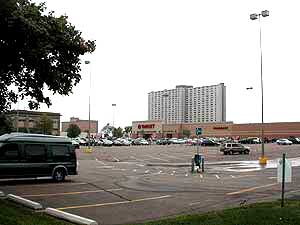|
Audio
Photos
Resources
|
 |
| Parking lots cover more than two-thirds of a 72-acre stretch of St. Paul's Midway area, between University and Snelling avenues. (MPR photo/Dan Olson) |
St. Paul, Minn. — Brian McMahon has measured the space devoted to parking lots in a bustling stretch of St. Paul's Midway shopping district, along University Ave. between Snelling and Lexington avenues. McMahon directs University United, a transit advocacy group.
"In the Midway retail area ... we have 72 acres, and 50 of the acres are surface lots," McMahon says.
More than two-thirds of the Midway shopping area McMahon measured is devoted to parking.
When he dug deeper, he discovered the way property taxes are levied in Minnesota encourages some business owners to create huge parking lots.
The per-square-foot property tax rate paid by a Midway bookstore is higher than that of a nearby big-box retailer surrounded by a sprawling parking lot. Under Minnesota's system, the bookstore building is considered a property improvement and taxed at a higher rate.
"So we have a two-story bookstore, locally owned and operated, paying almost three times as much per square foot as a national chain which essentially has two-thirds of the site set aside for parking," McMahon says.
The big-box retail store pays much more in total property taxes than the bookstore. But the effective property tax rate on its parking lot is much less than the bookstore's.
Transit planners have dubbed University Ave. between downtown Minneapolis and St. Paul the Central Corridor. It is slated for either rapid bus or light rail service sometime in the next 10 years.
Transit thrives where people shop and live. So McMahon prefers housing and storefront businesses instead of acres of parking lots. Encouraging that kind of development, he says, means changing the way Minnesota's property tax system works.
Mark Haveman, a policy analyst with the Minnesota Taxpayers Association, agrees. Haveman says a way to encourage development is to tie property taxes more closely to the value of the land, rather than what's built on it.
"You're reducing the tax burden on property improvements, which is generally considered to be a good thing, and shifting it onto the land portion, and more of the property tax falls on the land portion," says Haveman. "Then on properties that are underdeveloped, there's more of an incentive to do something with those properties."
Ramsey County Commissioner Raphael Ortega is intrigued, but unconvinced. Ortega oversees the county's planning for the proposed Central Corridor rapid bus or light rail line.
Ortega says tinkering with the property tax system might be called for if the area was a slum. But it's not. It bustles with business.
"There are lots of businesses there and (it's) diverse. To me the primary issue is how we keep the diversity of businesses we have established there already, and diversity of housing established there already," Ortega says.
Other communities are pursuing a different tax policy to encourage transit-oriented development. Voters have approved tax increases to pay for transit. Phoenix, Denver, Seattle, Portland and a few other cities have taxes that supply a dedicated source of money to help pay for transit, rather than tinkering with property taxes.
Dena Belzer, an analyst at the Center for Transit Oriented Development in the San Francisco Bay area, says those areas are betting the expanded transit service will boost property values and thus encourage development.
"In other words, it takes money to make money. They see themselves being able to greatly increase the value of their property, by investing some money in taxing themselves to pay for the transit in the first place," Belzer says.
Minnesota lawmakers repeatedly rejected ideas for dedicating tax revenues to help finance transit, until last session. And then they took a halting half step.
They approved allowing Minnesotans next year to vote on a constitutional change that would allow more of the sales tax on vehicles to be used to fund transportation, including transit.





